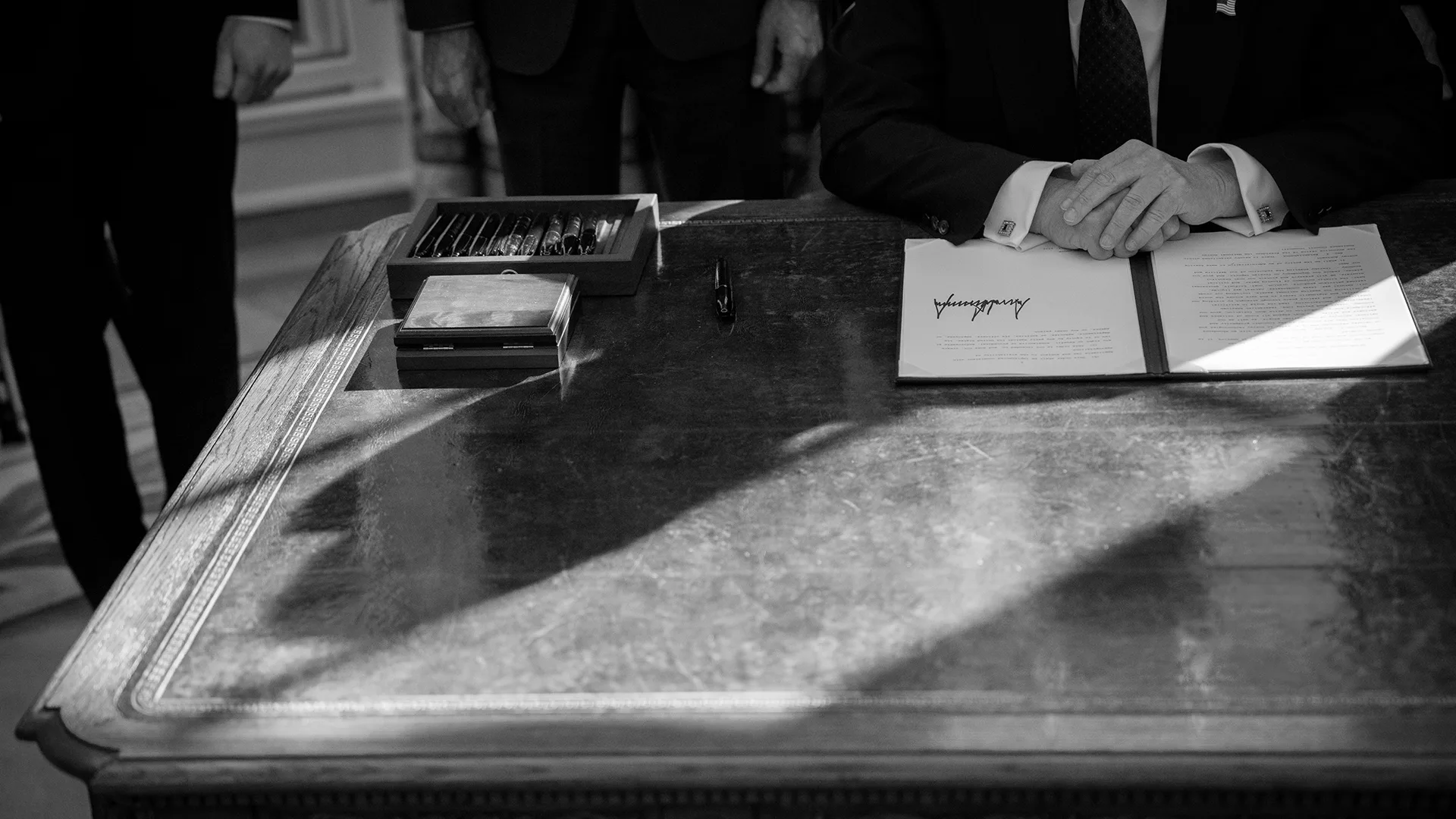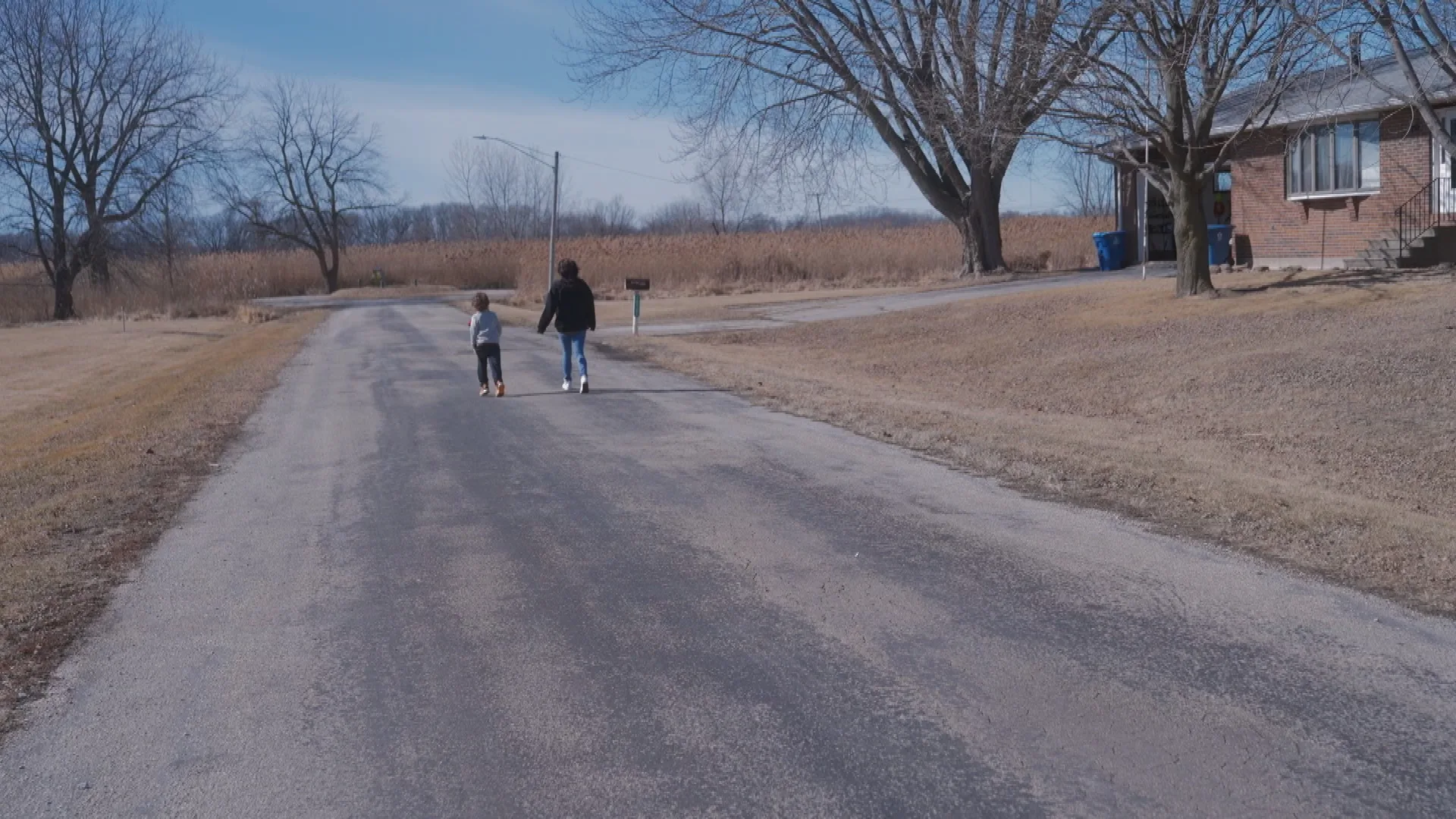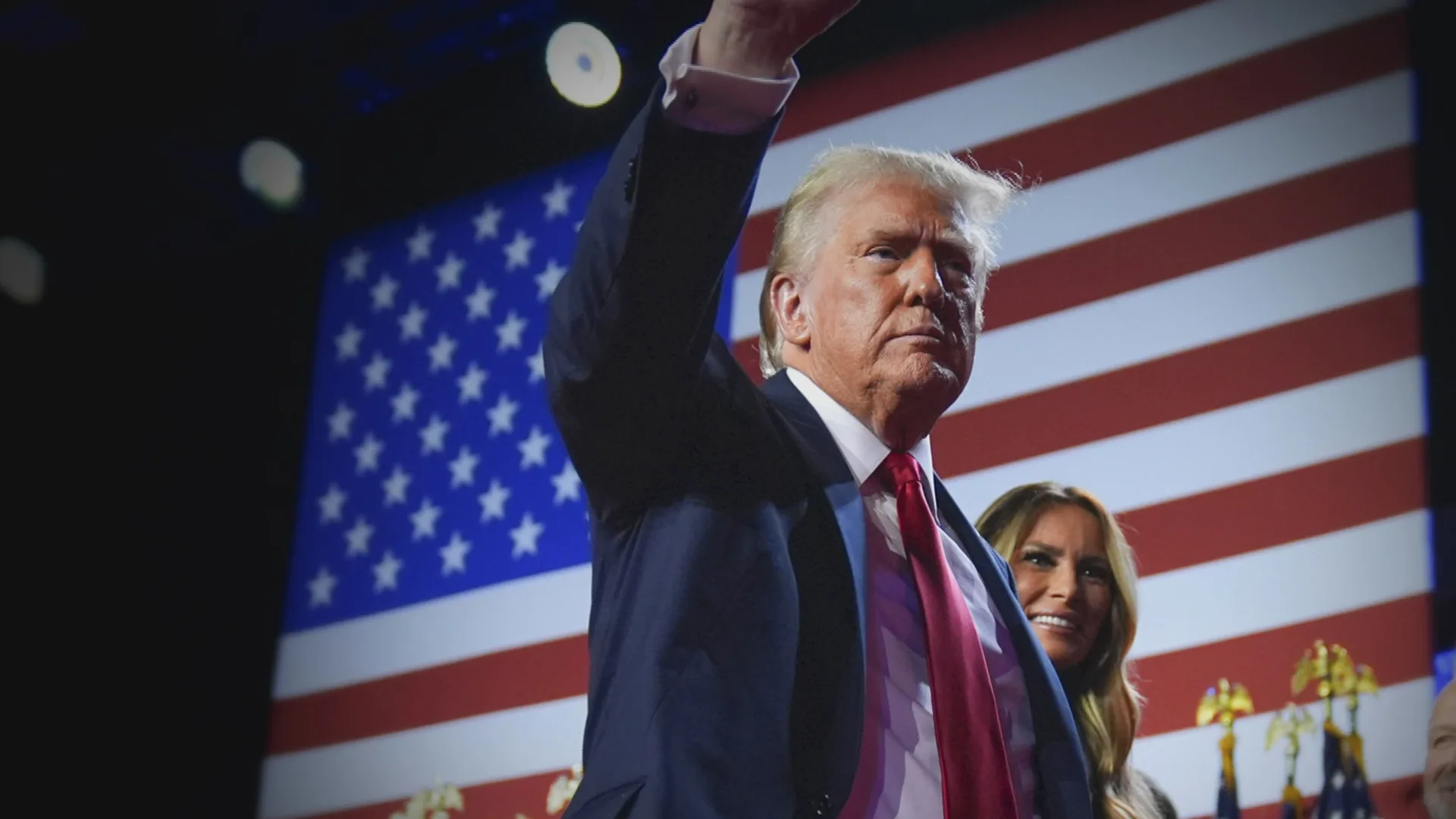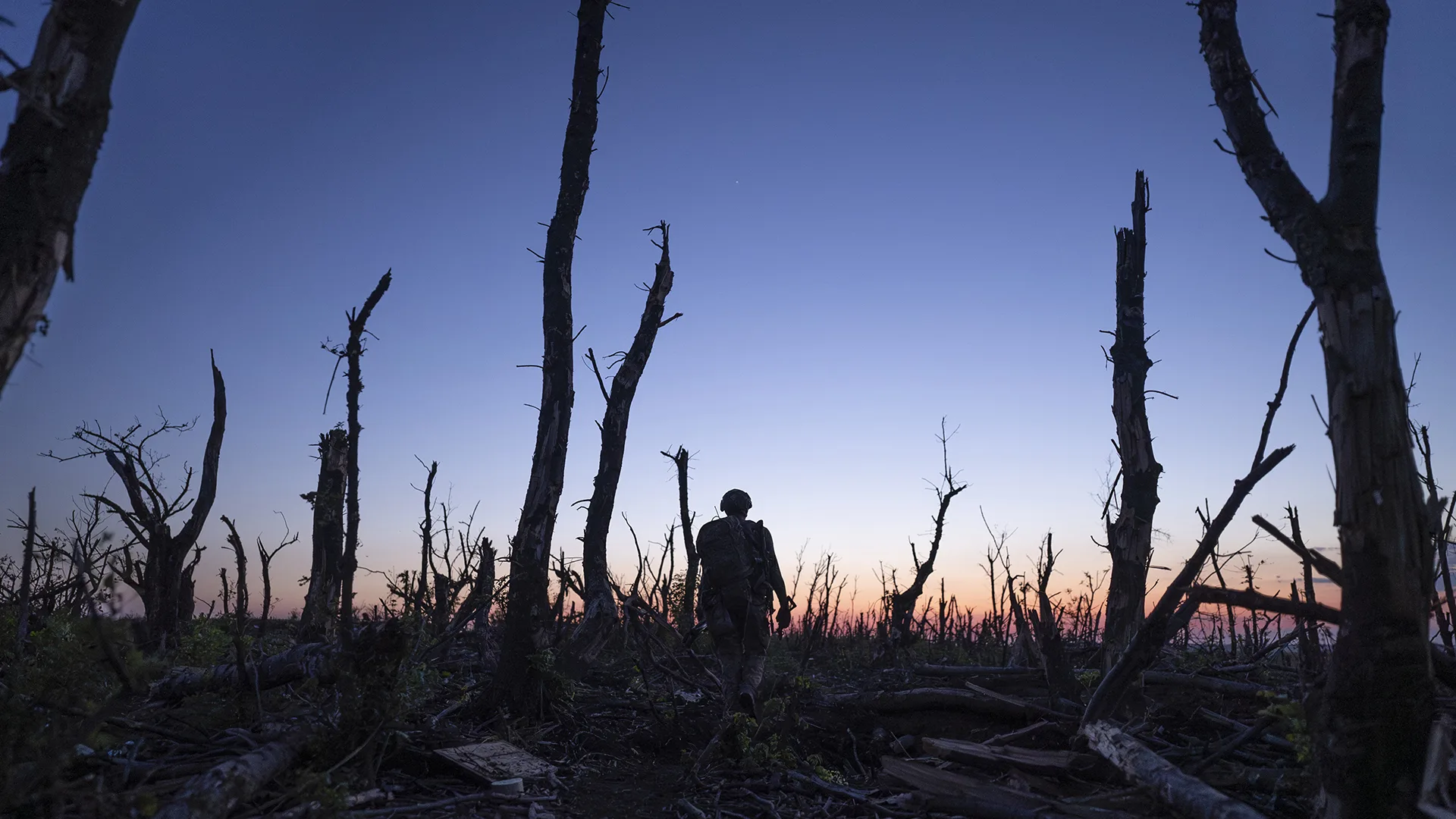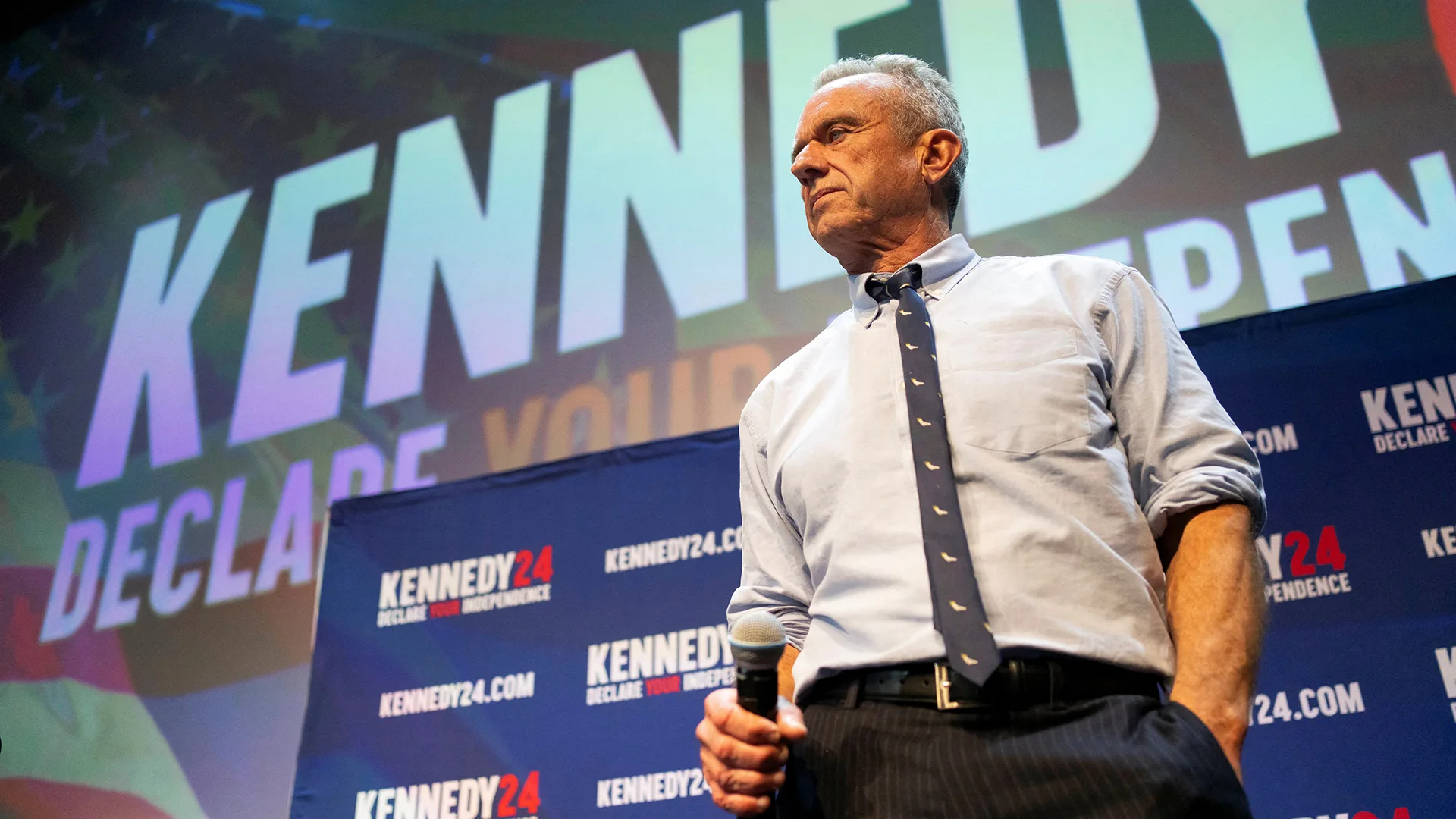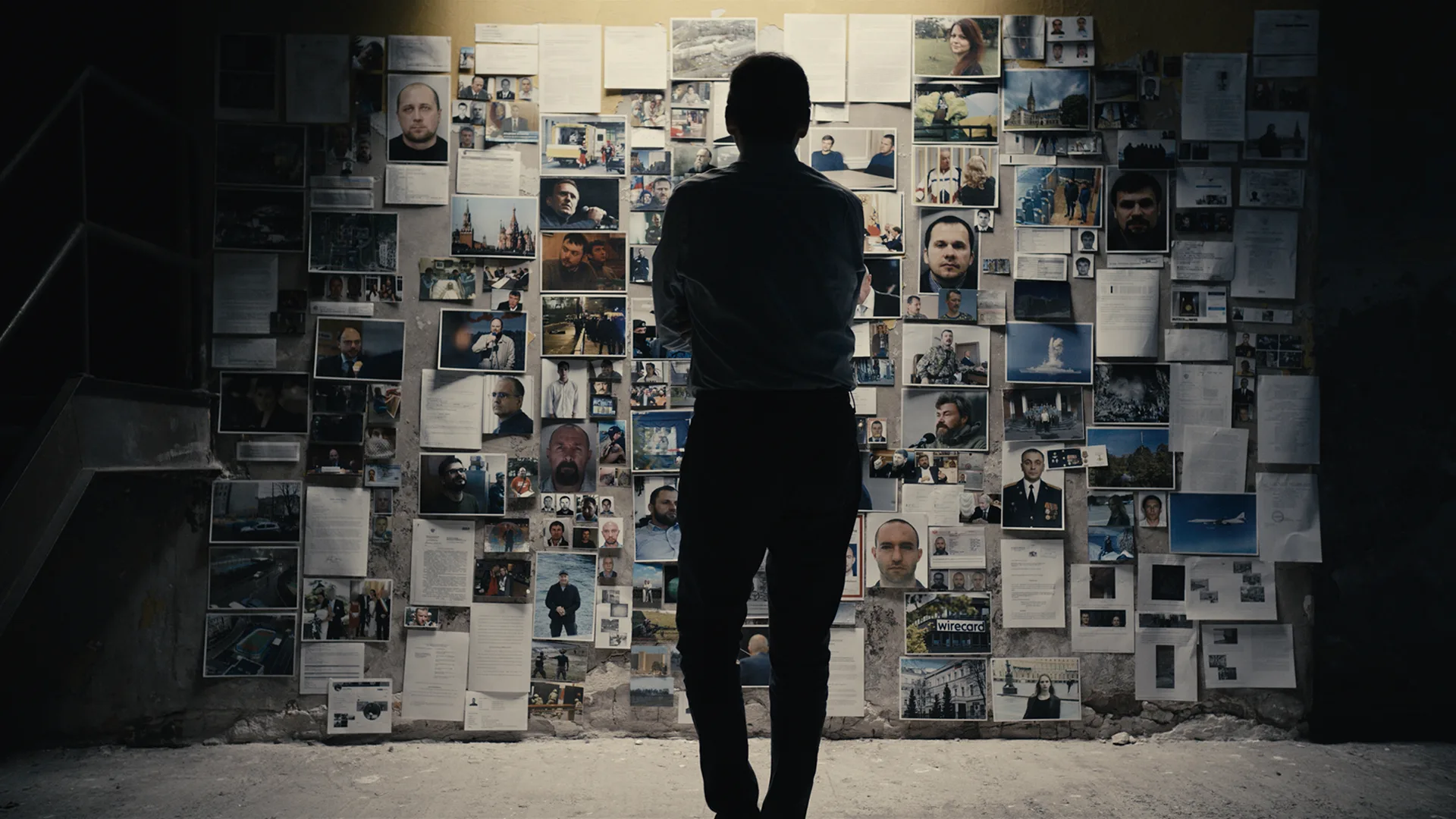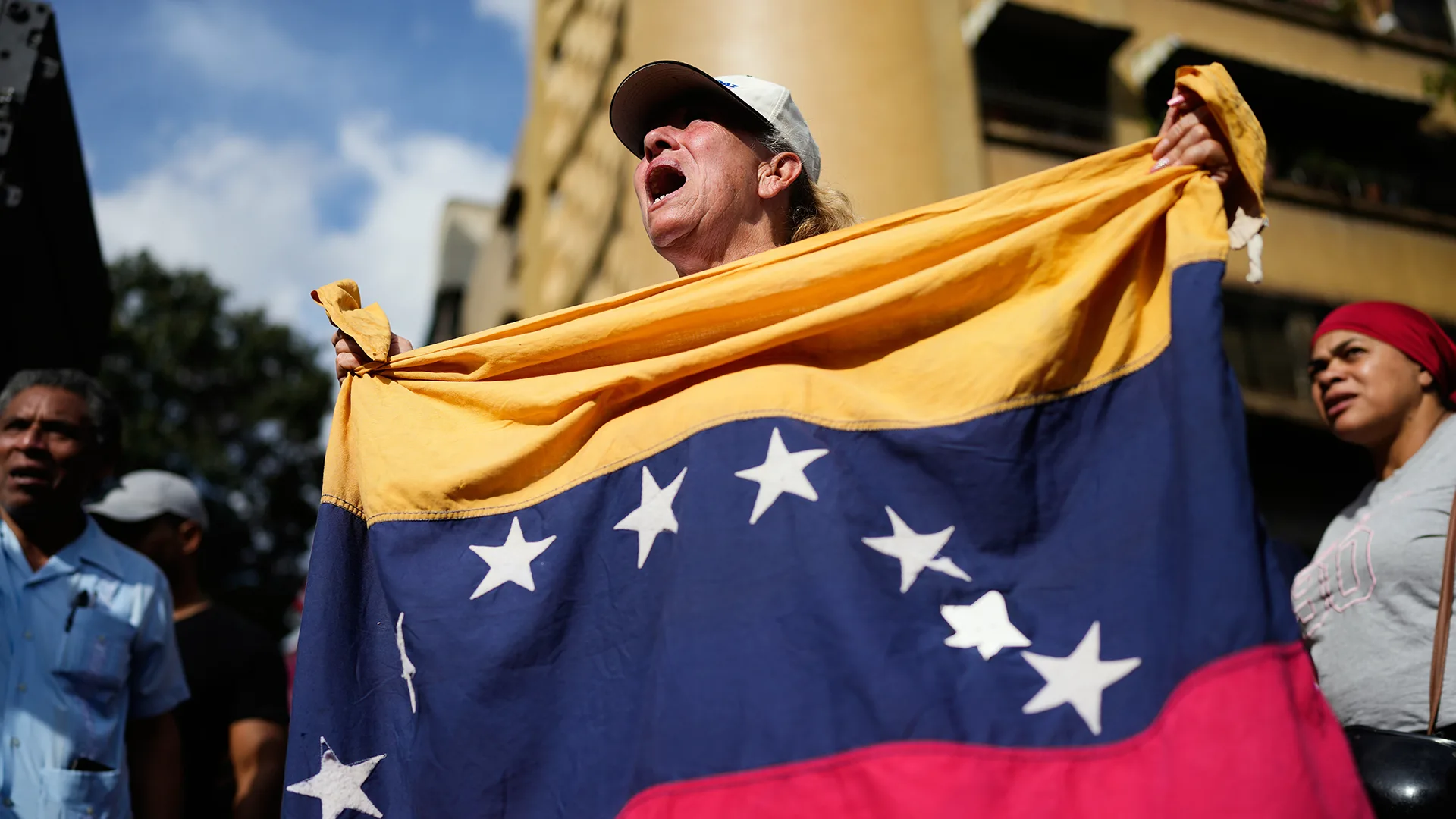Trump’s Comeback
January 21, 2025
54m
FRONTLINE traces defining moments over Donald Trump’s life and career, his 2020 election loss and his historic return to the presidency
Trump’s Comeback
January 21, 2025
54m
Share
FRONTLINE traces Donald Trump’s return to the presidency, overcoming unprecedented obstacles and opposition. With insider interviews, the documentary examines defining moments over his life and career, his 2020 election loss, felony convictions and his historic comeback.
Directed by
Produced by
Transcript
Credits
Journalistic Standards
Support provided by:
Learn More
Most Watched
The FRONTLINE Newsletter
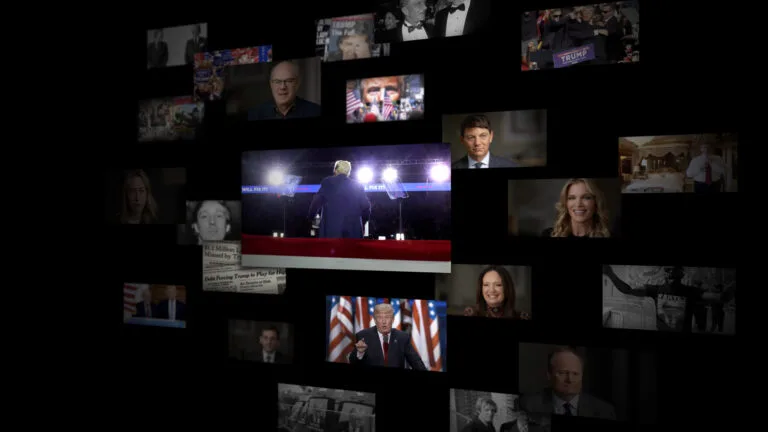
Trump’s Comeback
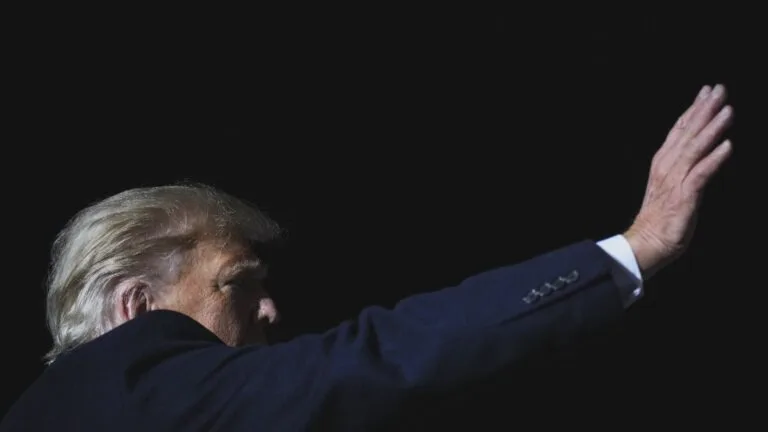
A Guide to the Criminal Cases Against Donald Trump
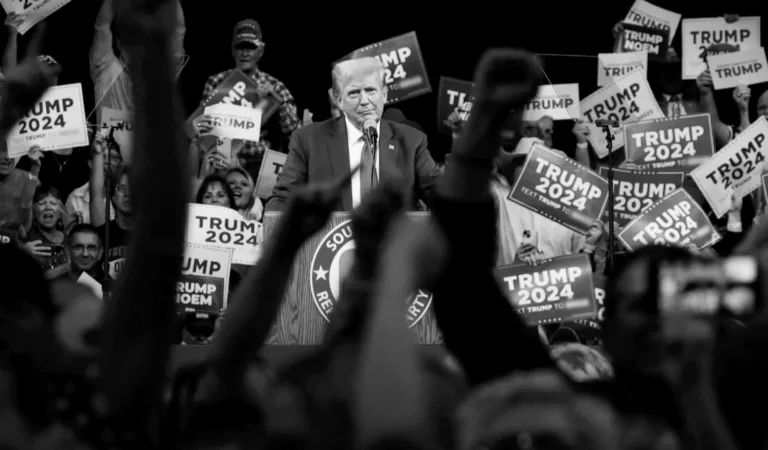
Trump’s Road from Jan. 6 Back to the White House
Related Stories

A Guide to the Criminal Cases Against Donald Trump

Trump’s Road from Jan. 6 Back to the White House
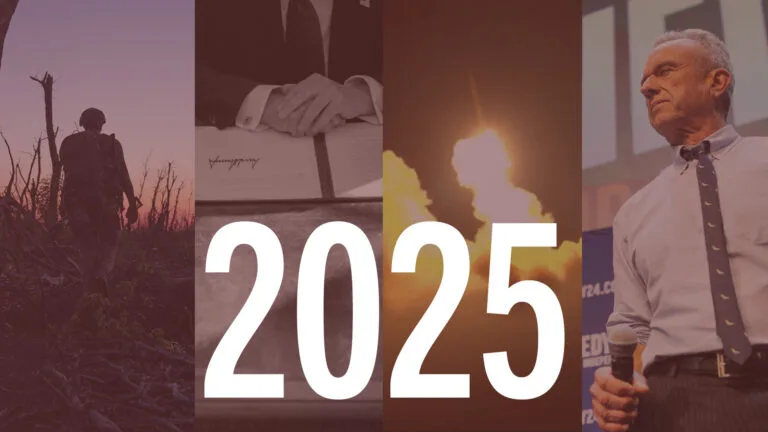
Watch 2025’s 10 Most-Streamed New FRONTLINE Documentaries
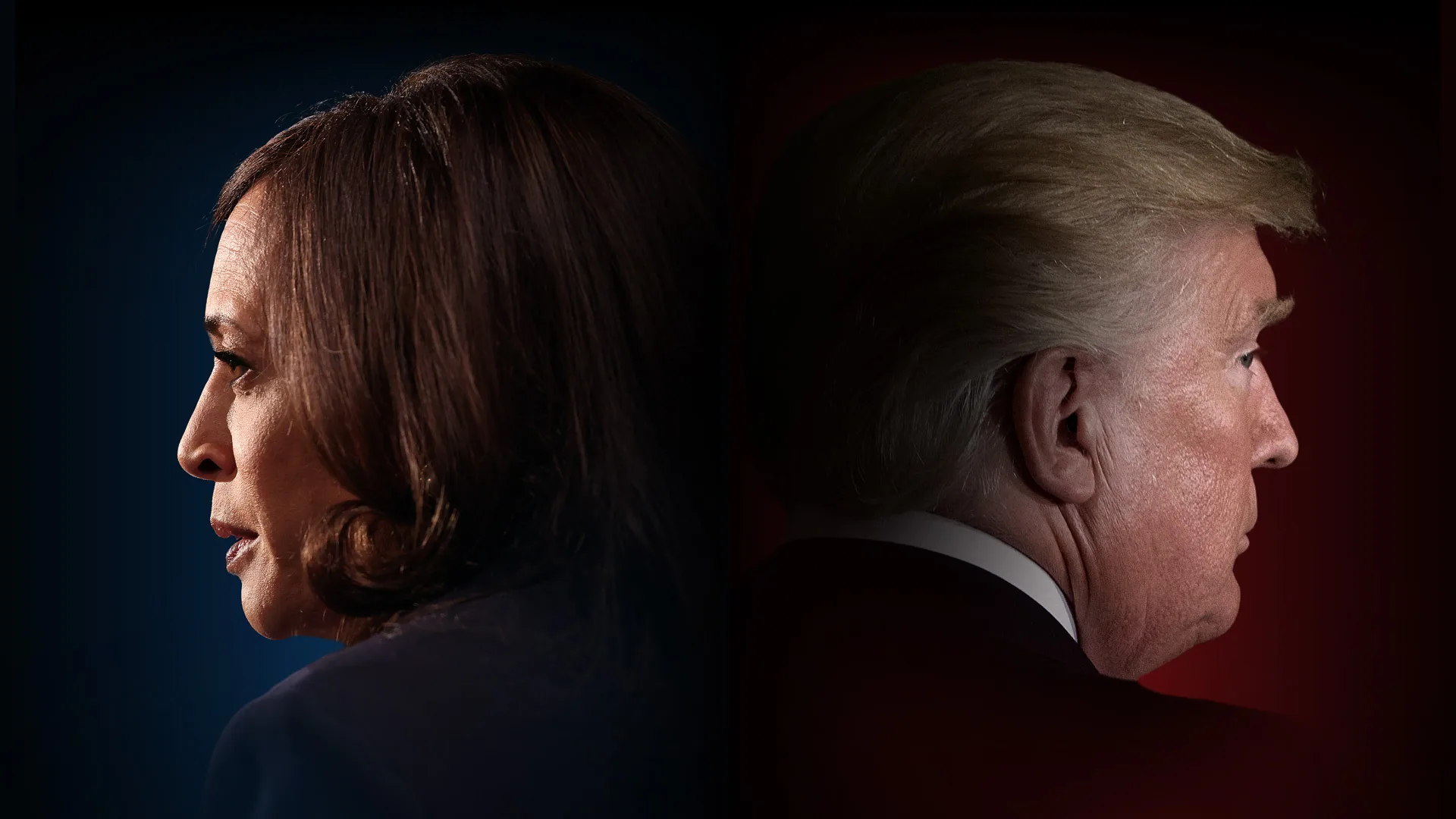
The Choice 2024: Harris vs. Trump
Related Stories

A Guide to the Criminal Cases Against Donald Trump

Trump’s Road from Jan. 6 Back to the White House

Watch 2025’s 10 Most-Streamed New FRONTLINE Documentaries

The Choice 2024: Harris vs. Trump
MALE NEWSREADER:
For Trump, today’s inauguration marks the greatest political comeback in generations…
MALE NEWSREADER:
—comes back to the White House. Remarkable when you consider the way he left the White House.
MALE NEWSREADER:
—enjoying what was thought to be an impossible milestone.
MEGYN KELLY, The Megyn Kelly Show:
You think back to after Jan. 6. The thought of him coming back to the presidency was not even remotely a possibility. A total impossibility to everyone but Trump.
JOHN ROBERTS, Chief Justice of the United States:
So help me God…
DONALD TRUMP:
So help me God…
JOHN ROBERTS:
Congratulations, Mr. President.
FEMALE NEWSREADER: The political comeback is complete. He is now president…
HOGAN GIDLEY, Fmr. Trump Deputy Press Secretary:
We will never see anything like this in the lifespan of this country, I think, ever again. It wasn’t just the most historic, most improbable, impossible comeback. It was a roar-back.
NARRATOR:
It was Donald Trump’s greatest comeback in a lifetime of trying to prove he was a winner.
MARC FISHER, Co-author, Trump Revealed:
In the scope of American history, it’s almost unbelievable. In the scope of Donald Trump’s life, it’s kind of routine. The story of his life is massive swings between utter failure and glorious victory. And here’s Trump about as triumphant as it gets.
NARRATOR:
It’s a story that goes back decades.
PETER BAKER, The New York Times:
I don’t think you can understand Trump’s presidential career without understanding his history in business, in entertainment, his life story in New York, his father and the family that he grew up in. For him, winning is everything.
RONA BARRETT, TV interviewer:
Tell me about the early days of Donald Trump. What kind of a family life did you have? I mean, did you go outside and play ball? Or did you have what we call a normal life, a normal upbringing?
DONALD TRUMP:
Well, Rona, I think I was probably brought up in a very normal fashion. I have brothers and sisters. I have wonderful parents. Wonderful family, really very wonderful family.
RONA BARRETT:
Are you like your dad?
DONALD TRUMP:
Well, I hope so. I have a very wonderful father, and I would hope I’d be somewhat like my father.
RONA BARRETT:
What’s he like?
DONALD TRUMP:
Strong, dynamic gentleman.
RONA BARRETT:
Is he loving? Kind? Giving?
DONALD TRUMP:
Absolutely, absolutely. Totally.
LOUISE SUNSHINE, Fmr. VP, Trump Organization:
Fred Trump was a machine. I mean, he was a human machine. He was driven beyond whatever the description of driven could ever mean. And when you look at the picture of Fred and you look at Donald, you see the great resemblance between the two. And when you think about Fred’s energy, you see how it is channeled through Donald.
TONY SCHWARTZ, Co-author, The Art of the Deal:
The way the game got played in his household was, “If you did not win, you lost.” And losing was you got crushed. Losing was you didn’t matter. Losing was you were nothing.
NARRATOR:
In the beginning, young Donald wasn’t the winner in the family. That was his older brother Freddie.
MARY TRUMP, Niece:
My dad was the favorite initially, simply because he was the first. He was the namesake and the heir apparent.
NARRATOR:
Mary Trump has been publicly critical of the way her famous uncle and grandfather treated her dad.
MARY TRUMP:
He mattered to my grandfather as an extension of his ambition. But as my father grew older, his personality became clear. He was sensitive. He was kind and generous. He liked hanging out with his friends, who adored him. And maybe worst of all, he had interests outside of the family business. My grandfather understood none of that.
GWENDA BLAIR, Author, The Trumps:
He wasn’t a killer. His father told the boys to be killers, but Freddie was never a killer. He wasn’t hyperaggressive. He wasn’t hypercompetitive.
MARY TRUMP:
My grandfather treated him so poorly, with such little respect, and made his life miserable. Donald was able to watch what my grandfather considered the mistakes that my dad made. He took that lesson to heart and became the killer, the tough guy, the person who would do anything in his power to be the winner. Could never be wrong, could never admit a mistake, and avoided being kind, because all of those things in my grandfather’s universe spoke to an unforgivable weakness. And my grandfather finally started to see in him the son he wanted.
NARRATOR:
As he grew older, Donald seized the chance to be the winner in his father’s eyes.
GWENDA BLAIR:
The older sister Mary Ann told me that Donald was like a wind, a hot wind at Fred Jr.’s back. He didn’t quite throw him under the bus, to mix metaphors, but he was certainly right behind him. Donald was standing right there and ready to take over.
RONA BARRETT:
Do you think you have to have a killer instinct in order to be successful?
DONALD TRUMP:
I think you have to have some. To a large extent I think you do have to have at least a winning instinct. I think that the world is made up of people with either killer instincts or without killer instincts. And the people that seem to emerge are the people that are competitive and driven and with a certain instinct to win.
NARRATOR:
As Donald rose in the family real estate business, Fred Jr. fell out of favor.
MARY TRUMP:
My grandfather shoved Donald’s success in my dad’s face a lot. And I think he found that difficult.
NARRATOR:
He left the family business and became an airline pilot—and an alcoholic.
MARY TRUMP:
My dad had just bought in, hook, line and sinker, into the family’s assessment of my father as an alcoholic failure who had never accomplished anything, and their line about Donald as this extraordinary, self-made, brilliant businessman.
MARIE BRENNER, Vanity Fair:
Donald told me that he and his father had perhaps been way too hard on him. They used to say to him, because he was an airline pilot, “What’s the difference between what you do, Freddie, and driving a bus?”
NARRATOR:
After years of heavy drinking, Fred Trump Jr. died of a heart attack at 42.
BARBARA WALTERS:
You had a brother, Fred Jr., who died. Your brother was open. Too vulnerable, maybe. Drank. Did this make you, I don’t know, close up? Keep it all inside?
DONALD TRUMP:
I learned a lot of things from Fred, but I did learn for myself that I don’t want to be open. I don’t want to make myself vulnerable.
NARRATOR:
He had become his father’s apprentice and early on learned a vivid lesson in how to engineer a comeback.
MICHAEL KRANISH, Co-author, Trump Revealed:
There came a day in 1973 when the federal government sued Donald and Fred by name, and their company, for racial bias. This was one of the greatest racial bias cases of its time.
MARIE BRENNER:
This was a particularly egregious case, because the Trump Organization had allegedly put large “C”s to connote people of color who were applying for apartments.
MICHAEL D’ANTONIO, Author, The Truth About Trump:
The government had him nailed. They had the Trump Organization nailed. There were multiple Trump employees who confessed that they had been instructed to divert Black applicants for apartments, to discourage them, to tell them that apartments had been rented when they hadn’t been.
JANE MAYER, The New Yorker:
Donald Trump’s regular lawyers tell him, “Settle it. Just move on. Do the right thing. Do what you’re supposed to do under the law.” And Trump’s not happy with that advice.
NARRATOR:
He wanted to fight the allegations. He found one of New York’s most notorious lawyers: the infamous Roy Cohn.
DAVID MARCUS, Roy Cohn’s cousin:
No one was as powerful as Roy Cohn. Roy Cohn was the man about town. He was the one who connected everyone. He was the one who put people together and deals together. In one day, you might see Carmine DeSapio—he was an old Mafia don. Or you might see Cardinal Spellman from the Catholic Church. Or you might see George Steinbrenner, the owner of the Yankees. They all were clients of Roy’s. It was a crazy assemblage of people.
GWENDA BLAIR:
Roy Cohn had 20 years of being a really aggressive, no-holds-barred, go for the jugular, fight back, anybody says something to you, throw it back at them guy. He was famous for that behavior.
ROY COHN:
I met him at a supper club, and we were seated at tables next to each other, we were introduced. And he said, “Listen, I’ve spent two days with these establishment law firms about a case we have”—it was a civil rights case, or something—”and they’re all telling us give up, do this, sign a decree and all of that.” He says, “I’ve followed your career and you seem—you’re a little bit crazy like I am, and you stand up to the establishment. Can I come see you?” And I said, “Sure.”
NARRATOR:
Cohn would lay out a comeback strategy that appealed to Trump: Do whatever it takes to win.
DAVID MARCUS:
When they met, Roy said to him, “You might be guilty; it doesn’t matter. Go after the Justice Department. Don’t ever admit guilt.”
KEN AULETTA, The New Yorker:
“Fight it, you’ll kill them; just deny everything and fight.” And Trump was totally taken by that, and he hired Roy Cohn as his lawyer.
DAVID MARCUS:
That was a defining moment for Donald Trump. Roy Cohn showed him that you can turn around a situation just by ignoring the facts and going after your attacker. Trump countersued the Justice Department for $100 million.
MALE VOICE [reading Trump quote]:
I have never, nor has anyone in our organization ever, to the best of my knowledge, discriminated or shown bias in renting our apartments.
TONY SCHWARTZ:
This is a classic example of where Trump begins to demonstrate something he talks about all the time today, which is, he’s a counterpuncher. So somebody comes after him and says that he’s done something nefarious and horrible, and he just goes back at them with all guns blazing. Boom, boom, boom. And admits nothing. Never admit anything. Never say you made a mistake. Just keep coming.
MARIE BRENNER:
The discrimination case wound up where the Trumps agreed to a large settlement. And they played it as a win. The strategy was you always play it as a win.
DAVID MARCUS:
Roy went on the offensive and said, “This is a victory.” Trump was vindicated. He knew before anybody else did that the court of public opinion is often more important than a court of law. The lesson from Roy Cohn was don’t go the way the establishment does. Don’t play by the rules.
NARRATOR:
With Roy Cohn’s connections and his father’s money, Trump put his mark on Manhattan: a luxury high-rise that could project his status as a winner.
GWENDA BLAIR:
When he built Trump Tower, he got a whopper tax abatement that was intended for poor areas of town. His building was built a block away from Tiffany’s. That was a deteriorating area of town? I don’t think so. You can get away with almost everything, and Donald took that to heart. That’s the only metric that counts.
NARRATOR:
On opening night, Trump’s salesmanship seemed to pay off.
NIKKI HASKELL, Trump friend:
And they had the fabulous opening. The creme de la creme of New York showed up for the opening of the Trump Tower. It was an amazing event, and it looked so glamorous with the waterfalls and everything. It was really magnificent. Donald was like a kid in a candy store, he was so excited. You have dreams and aspirations, and you hope they’re going to turn out great, and then when they turn out, and they’re great, look how happy you are. It was just a monumental day for him.
NARRATOR:
Despite it all, he couldn’t win over those he most wanted to impress.
MARIE BRENNER, Vanity Fair:
The establishment of New York thought of Trump, if they thought of him at all, as a joke, as a vulgarian, as someone who was silly, who was just a vulgar builder.
KEN AULETTA:
When you talk to real estate moguls in New York, to this day they disdain Donald Trump. They thought he was a guy interested in self-exposure and lacked humility and modesty.
MICHAEL D’ANTONIO:
He was considered loud and obnoxious and too self-centered and not someone who fit in. This is where Donald’s resentment of the elite comes from.
NARRATOR:
Trump was determined to overcome the ridicule, to prove the elites wrong.
MARC FISHER:
He realized that it didn’t matter if the other rich folks rejected him. What mattered was persuading the larger public that “Trump” was the height of luxury. Put Trump out there as this impossibly rich playboy who had the ability to buy up anything, and be this giant figure.
NARRATOR:
It would become part of the Trump playbook: Go big.
FEMALE REPORTER:
Donald Trump just doesn’t know the word “small” or the meaning of the word “small.” His real estate holdings are enormous.
MALE REPORTER:
A prince of New York, he’s Donald Trump, the man who has everything.
MARIE BRENNER:
Trump had an intuitive understanding that as long as his footprint was getting larger in the city, that he could eventually overcome what any establishment would think, and that they were going to become fossilized and he would rise.
MALE REPORTER:
He puts his name on almost everything he builds, says it’s a symbol of quality.
GWENDA BLAIR, Author, The Trumps:
It did seem out of control. Casino, after casino, after casino, after casino. Hotels. Yacht. Everywhere he turned, another big piece of real estate here, another big piece of real estate there.
ALAN MARCUS, Fmr. PR, Trump Organization:
It’s all about Donald. It’s all he cares about. He didn’t talk about building a great company, he talked about building Donald.
NARRATOR:
Alan Marcus would become Trump’s longtime public relations adviser.
ALAN MARCUS:
Everybody puts complexity behind Donald. There is no complexity. It’s all simplicity. It’s all about Donald. It’s total narcissism.
NARRATOR:
But behind the scenes, Trump’s empire was in trouble.
MALE NEWSREADER:
The swashbuckling real estate mogul is in a cash crunch.
MARC FISHER, Co-author, Trump Revealed:
The businesses never really did that well. He was a failure again and again and again. Whether it was with his casino hotels in New Jersey, whether it was with the Plaza Hotel in New York, one project after another would end in failure.
MALE NEWSREADER:
Trump’s casino business will file for bankruptcy next month—
FEMALE NEWSREADER:
Midas had lost his touch.
MARC FISHER:
Six bankruptcies. Stiffing contractors left and right. Vendors suing him again and again. It is a litany of failure.
NARRATOR:
Trump was being portrayed as a loser.
BARBARA RES, Fmr. VP, Trump Organization:
I think he was scared. I think he was in a very bad shape for a long time. But stubborn and resilient and demanding and self-confident, all at the same time. He never really weakened, and you never saw a weakened Donald.
MALE REPORTER:
With all your financial problems, do you think you will survive?
DONALD TRUMP:
Why do you say there are problems?
MALE REPORTER:
Are you not having problems?
DONALD TRUMP:
Don’t believe the press. Don’t believe everything you read.
MALE REPORTER:
Is everything financially OK?
DONALD TRUMP:
Don’t believe everything you read, I’ll tell you.
TONY SCHWARTZ, Co-author, The Art of the Deal:
I don’t think he really believed that it was over for him for one minute. The minute he thinks that way, it’s over. If I start to not think of myself as a winner, then what am I? I’m a loser. That essentially means I don’t exist. I’m nothing.
NARRATOR:
It was the strategy he’d learned from his father and from Roy Cohn: never admit defeat.
NEWT GINGRICH, Author, Understanding Trump:
Now a guy who has that kind of chutzpah is genuinely unique. I think his most revealing book is The Art of the Comeback. The opening page he says, “This is the moment where you either get depressed or you start planning the comeback, and this is the story of the comeback.”
NARRATOR:
To fuel that early business comeback, he turned to the key asset he had left: his name.
TONY SCHWARTZ:
It really dawned on Trump that he could make a huge business empire out of putting his name everywhere. “God, I don’t have to kill myself trying to buy up land and deal with zoning boards and go crazy, and half the time it doesn’t work anyway. Why don’t I just sell my name?”
NARRATOR:
For Trump, real estate was now a side business; marketing his own name, a full-time job.
DONALD TRUMP:
It’s amazing. A Big N’ Tasty for just a dollar? How do you do it? What’s your secret?
NARRATOR:
He used his celebrity to sell everything from computers to hamburgers.
McDONALD’S TV AD:
Got a buck? You’re in luck.
DONALD TRUMP:
Together, Grimace, we could own this town.
GWENDA BLAIR, Author, The Trumps:
He’s seen that it’s a consumer country. We’re all consumers. We’re trained to be consumers. We’re used to being sold to. He’s a really good salesman.
MALE WWE ANNOUNCER 1:
“Stone Cold” Steve Austin—
DONALD TRUMP:
What’s going on over here?
NARRATOR:
He was willing to do almost anything.
MALE WWE ANNOUNCER 1:
Hey, look at this! Donald Trump! Donald Trump!
MALE WWE ANNOUNCER 2:
Trump! Donald Trump taking down—
MALE WWE ANNOUNCER 1:
[Laughs] Oh, my god!
TIMOTHY O’BRIEN, Author, TrumpNation:
He was seen for quite a long time as a punch line to jokes about the excesses and the failures of the 1980s, and he’d become a human shingle and a punch line. The Apprentice turned all of that on its head.
DONALD TRUMP:
My name’s Donald Trump, and I’m the largest real estate developer in New York. I own buildings all over—
MICHAEL D’ANTONIO, Author, The Truth About Trump:
Can you imagine you’re Donald Trump, and you’ve been creating yourself as the people’s billionaire for 20 or 30 years. And someone comes along and says, “I want you to play that role on TV once a week.” This was a dream come true. I think Donald would have paid to get that gig.
DONALD TRUMP:
—and who will be The Apprentice?
NARRATOR:
Trump had come back big from the financial abyss.
ROGER STONE, Longtime Trump adviser:
For 14 seasons, he is viewed in a perfect light.
DONALD TRUMP:
OK, folks, I’m really busy today, so we’re going to go quickly.
ROGER STONE:
He’s perfectly made up. He’s perfectly coifed. He’s perfectly lit. He’s in the high-backed chair making tough decisions. What’s he look like? He looks like a president.
DONALD TRUMP:
You’re no longer with us, you’re fired.
I have to say you’re fired.
You’re not going to be thrown out, OK?
MALE APPRENTICE CONTESTANT:
Thank you. Thank you very much.
ALAN MARCUS:
On a script, sure, everybody’s a genius.
MALE APPRENTICE CONTESTANT:
Sorry to interrupt again.
DONALD TRUMP:
Jason, Jason. This is a tough one—you’re fired.
ALAN MARCUS, Fmr. PR, Trump Organization:
People looked and said, “Wow, what a businessman. What a great manager.” It’s all a fantasy. It was all fiction. But people think it’s real.
OMAROSA MANIGAULT NEWMAN, Contestant, The Apprentice:
The Apprentice allowed him to tell his story on his own terms. “I am a big, successful, huge developer. I’m a billionaire.” He got to sell that image to America, and they bought it.
MALE NEWSREADER:
Donald Trump, Emmy-nominated—
OMAROSA MANIGAULT NEWMAN:
They loved it, and they couldn’t get enough of it.
MALE NEWSREADER:
The one and only Donald Trump!
JIM DOWD, PR director, The Apprentice:
His popularity was never higher, and he could do no wrong at that stage. And I think that he realized, “Wow, if I’ve hit the high, let’s take it to the—Where can you go from there? I want to be president.”
MARC FISHER, Co-author, Trump Revealed:
It was only after The Apprentice that he saw that he could take that fame nationwide. And if he could take that fame nationwide, what bigger stage was there to play on than the presidency?
MALE ANNOUNCER:
The next president of the United States, Donald J. Trump.
CROWD [chanting]:
Trump! Trump! Trump! Trump! Trump! We love you, Trump!
DONALD TRUMP:
How does my hair look? Is it OK?
DAN BALZ, The Washington Post:
He recognized that entertainment is now a central part of American politics. You can fuse everything that he had learned about celebrity and entertainment and ratings from having been on The Apprentice into a presidential campaign.
DONALD TRUMP:
We’re tired of what’s happening. We’re going to take our country back, we’re going to take it back. We’re going to take it back.
KELLYANNE CONWAY, 2016 Trump Campaign Manager:
He had this way of connecting with people where they felt, improbably, that their voice in politics was a total political novice, who like them is an outsider to the system. They felt that Donald Trump was clasping hands with them on the outside of the glass, pressing their nose, looking in and saying, “When is it my turn? What’s in it for me?”
CROWD [chanting]:
Donald Trump! Donald Trump!
DONALD TRUMP:
This campaign is about giving a voice to those who don’t have one. I am your voice! I am your voice!
BRAD PARSCALE, 2016 Trump campaign strategist:
This movement’s been there, and it was looking for the right leader to say, “We matter.” The wood was out there drying and drying and drying; it was just waiting for the right person to throw the match in and then lead the fire in the right direction. And that’s what Donald Trump did.
MALE TRUMP SUPPORTER:
He speaks for the people. Things he saying I’ve been saying for years. When he wins, we all win.
NARRATOR:
Trump was willing to go where other politicians wouldn’t.
ALAN MARCUS:
Donald says, “People love to hate, and so I’m going to build hatred for immigration.”
DONALD TRUMP [chanting]:
Build the wall! Build the wall! Build the wall!
ALAN MARCUS:
And says, “These people are rapists.”
DONALD TRUMP:
When Mexico sends its people, they’re bringing crime. They’re rapists. And some, I assume, are good people.
MEGYN KELLY, The Megyn Kelly Show:
Establishment-types recoiled in horror, but this other segment of the population which had been ignored for so long saw, “That’s our fighter. That’s our guy. He’s not with them.”
DONALD TRUMP:
I am with you, I will fight for you and I will win for you.
MEGYN KELLY:
“Finally, someone who doesn’t care if he’s part of their club or not. Which makes him part of our club.”
NARRATOR:
But then, just before the 2016 election, a crisis that threatened to end it all.
KELLYANNE CONWAY:
What happened on Oct. 7 is, we were in a conference room in Trump Tower, and Hope Hicks was out in the atrium and is signaling to me. So I went out and she said, “I don’t know what to make of this. It’s just an email.”
STEVE BANNON, 2016 Trump Campaign CEO:
She got this transcript. And she’s like, about to cry. She goes, “Oh, this is terrible.” I said, “What are you so upset about? What is this?” “The Washington Post is going to publish this story in an hour.” And I go, “What’s so bad about it?” And she goes, “Well, look at it! He says, ‘I’m going to grab them by the *****.’” [Laughs] And I go, “Oh, maybe I haven’t focused on that.” So I look down, I go, “Oh, OK, OK.”
DONALD TRUMP:
You know I’m automatically attracted to beautiful—I just start kissing them. It’s like a magnet. [Laughter] And when you’re a star, they let you do it. You can do anything.
BILLY BUSH, Access Hollywood reporter:
Whatever you want.
DONALD TRUMP:
Grab ’em by the p****.
BILLY BUSH:
[Laughs]
DONALD TRUMP:
You can do anything.
MEGYN KELLY:
One hundred percent I thought it was over for Trump. I didn’t think he was going to withdraw after Access Hollywood, but I certainly thought he had no chance of winning. That was unlike anything we’d ever seen before, that sort of a tape with that kind of language.
MALE NEWSREADER:
The Trump camp has swiftly launched into disaster mode.
MALE NEWSREADER:
This is a political disaster.
MALE NEWSREADER:
—a big, big development in this campaign—
BRAD PARSCALE:
Reince had pretty much told the RNC, “This thing’s over. Exit stage left, get out of the building.” And there started to be this mass exodus.
STEVE BANNON:
Now we’ve got a full revolt. Pence is nowhere to be found; he’s not out there saying—he gives—we get a letter from him. Paul Ryan’s out of the campaign. McConnell’s out, because they thought they were going to lose the Republican Party. They thought every woman in America will never vote for a Republican again, right, because this guy’s a barbarian.
NARRATOR:
Over the years several women had accused Trump of sexual misconduct. And now more would come forward.
FEMALE NEWSREADER:
After the now-infamous tape came out, so have more allegations of unwanted sexual advances from incidents that allegedly happened years ago.
MALE NEWSREADER:
Two more women have come forward claiming he groped them, including a former contestant on Trump’s reality show, The Apprentice.
NARRATOR:
It looked like his past was catching up to him.
MALE NEWSREADER:
Women accusing him of groping and sexually assaulting them over the years, at least seven of them now. Two more women came forward just this afternoon—
NARRATOR:
But he defended himself, denied the allegations of sexual misconduct and was undeterred.
ROBERT COSTA, CBS News:
He had this belief, going back to his time with The Apprentice, going back to his long years in New York, that this country, the people who could elect him president of the United States, saw things much more like he did, which was a shrug, that this is just Trump being Trump.
CROWD [chanting]:
Trump! Trump! Trump! Trump! Trump! Trump!
STEVE BANNON:
You’re all the way up on the 25th floor at Trump Tower [laughs], you can hear, on the streets—Trump goes, “What’s that?” And you look down—
CROWD [chanting]:
Trump! Trump! Trump! Trump! Trump! Trump!
STEVE BANNON:
—there’s literally this mob down there. He just goes, “These are my people. I’ve got to go talk to my people.” Trump just walks out there. [Laughs]
MALE TRUMP SUPPORTER:
Here he is! Donald! Donald!
ALAN MARCUS, Fmr. PR, Trump Organization:
Nothing humiliates Donald Trump. He walked out onto the street, people cheered him and he said, “It’s over! It’s good.” And he was right. People didn’t care. And his people were still there; they still followed him.
DONALD TRUMP:
They say I have the most loyal people, did you ever see that? Where I could stand in the middle of Fifth Avenue and shoot somebody and I wouldn’t lose any voters, OK? It’s like incredible. [Laughter]
MARC FISHER, The Washington Post:
From the Fifth Avenue comment to the Access Hollywood moment, every time people try to hold him to account, every time people try to impose consequences on him, that deepens the support that he gets from his base, because it says to the public, “This guy is taking the arrows for you, and when he stands up for himself, he’s fighting for you.”
MALE NEWSREADER:
Donald Trump goes from being the candidate to the leader.
FEMALE NEWSREADER:
A textbook case of disruption coming to Washington.
NARRATOR:
Donald Trump had come back from scandal once again, to win the presidency.
PETER BAKER, Co-author, The Divider:
He looks at the presidency as a show. Remember, he was a host of a reality show for 14 years. He even says that to his aides: “Think of every day as another half-hour episode in this show. So how do we get attention?”
DONALD TRUMP:
Now arrives the hour of action.
MALE NEWSREADER:
Chaos, confusion and anger growing in the wake of President Trump’s immigration ban.
FEMALE NEWSREADER:
—stops all entry from some predominantly Muslim nations.
DONALD TRUMP:
We want our country to be a sanctuary for law-abiding Americans, not criminal aliens.
MALE NEWSREADER:
The growing outrage over families being separated at the border—
FEMALE NEWSREADER:
—showcasing unbelievable cruelty on the part of the U.S. government.
MEGYN KELLY:
We’d never had a president like that.
DONALD TRUMP:
How am I doing? Am I doing OK? I’m president. Hey! I’m president! Can you believe it, right? I don’t know.
MEGYN KELLY:
Trump does enjoy being the center of attention. When Trump is on the national scene, you think about him all the time, because attention is his oxygen.
DONALD TRUMP:
Russian collusion. Give me a break.
MARC FISHER:
You see the same tools that he’s always used to defend himself.
MALE REPORTER:
—that you may have indictments—
DONALD TRUMP:
I’m not concerned about anything with the Russian investigation, because it’s a hoax. That’s enough, put down the mic.
MALE REPORTER:
Mr. President, are you worried about indictments coming down—
MARC FISHER:
Which is go on the attack. Attack the investigators.
FEMALE NEWSREADER:
President Trump now facing outrage after firing Comey—
DONALD TRUMP:
I did you a great favor when I fired this guy.
JANE MAYER, The New Yorker:
It’s very much the Roy Cohn message: just counterpunch no matter what. And from the start he always hits as hard as he possibly can, and harder than he’s been hit, if he can.
CHARLOTTESVILLE PROTESTERS [chanting]:
Jews will not replace us!
MALE NEWSREADER:
Mayhem in Charlottesville—
MALE NEWSREADER:
President Trump under fire after Charlottesville, saying that there were, quote, “very fine people on both sides.”
NARRATOR:
Controversy after controversy, Trump would come out on top.
MARC FISHER:
I see Charlottesville as a way of using race to cement his relationship with his base.
DONALD TRUMP:
I think there’s blame on both sides, and I have no doubt about it and you don’t have any doubt about it either.
CAROL LEONNIG, Co-author, A Very Stable Genius:
It happens over and over again where people say, “Oh, my gosh, this is it. No president can survive this.” Quite the opposite. Donald Trump will prove at this moment and many others to come that nothing defeats him.
FEMALE NEWSREADER:
Dramatic end to a nearly five-month war with Democrats. President Trump has been acquitted in his impeachment trial.
MALE NEWSREADER:
The impeachment is finally over.
MALE NEWSREADER:
President Trump acquitted by U.S. Senate.
DONALD TRUMP:
Thank you very much everybody, thank you. Thank you very much. Thank you.
NARRATOR:
It was a presidency marked by constant fighting: to control the Republican Party, transform the Supreme Court, avoid legal and political challenges and win reelection.
BRAD PARSCALE, 2020 Trump Campaign Manager:
By February of 2020 you see Trump’s popularity skyrocket. We come into a poll. I show him in the Oval, and he was winning in a landslide. He had a battle map that no one had seen since Reagan. That is February of 2020. And I remember going home that night and seeing the pictures coming out of China and Italy and other places of COVID.
MALE NEWSREADER:
The growing worries and response to the deadly coronavirus—
MALE NEWSREADER:
Wuhan, China, that’s the epicenter of this—
MALE NEWSREADER:
Three cities now under lockdown in China.
BRAD PARSCALE:
And I started scratching my head, and I was like, “This thing could take all of this down.”
NARRATOR:
Trump would fight COVID the Trump way.
MARC FISHER:
He immediately turned to what he knew best, which is the rules of Trump, the way he’s always done business. So he puts himself at the center.
FEMALE NEWSREADER:
President Trump taking to the White House briefing room surrounded by his—
MARC FISHER:
Daily briefings.
DONALD TRUMP:
We’re ready for it. It is what it is. We’re ready for it. You have 15 people, and the 15 within a couple of days is going to be down to close to zero.
ANTHONY SCARAMUCCI, Fmr. Trump Communications Director:
What he learned in terms of coping with his parents, what he learned in New York real estate, what he learned from Roy Cohn, is, “I can manufacture to get a very large people to believe my truth.”
DONALD TRUMP:
We have done an incredible job. We’re going to continue, it’s going to disappear. One day it’s like a miracle, it will disappear.
And we’re prepared, and we’re doing a great job with it and it will go away. Just stay calm.
And again, this is going away. This is going away.
ANTHONY SCARAMUCCI:
But this is a crisis that his 45-, 50-year skill set, the Roy Cohn playbook, doesn’t work with this crisis, because it’s scientific. It’s fact-based science.
CAROL LEONNIG:
His reaction to COVID totally fits his playbook for all the other crises that he not only waged and waded through but triumphed over.
FEMALE NEWSREADER:
Empty streets lead to packed emergency rooms across New York City—
CAROL LEONNIG:
It’s just that this one is so undeniable. People are dying.
FEMALE NEWSREADER:
Paralysis in this typically vibrant city in just a matter of weeks.
FEMALE NEWSREADER:
FEMA sent 85 refrigerated trucks to New York City to hold the people who’ve perished.
BRAD PARSCALE:
I knew it was really bad. Within a few months his polling was in the bucket. I tried to kind of have an intervention. My last, throw-myself-onto-the-hot-coals was, “We’re losing, and we’re losing because of how we’re handling COVID.” We were wrong on our framing of what we were doing on COVID. The on-stage presentations from Trump were being wrong, and if the election’s held today, we lose. And he didn’t like hearing that. He got very upset with me. That was the last time I ever was in the Oval Office.
NARRATOR:
Trump once again found himself on the ropes.
MALE NEWSREADER:
The Fox News decision desk can now project that former Vice President Joe Biden will win Pennsylvania and Nevada.
FEMALE NEWSREADER:
He is President-elect Joseph Robinette Biden.
NARRATOR:
He’d lost. But he’d now do what he’d always done.
TIMOTHY O’BRIEN, Author, TrumpNation:
One of Donald Trump’s great strengths, and also one of his great weaknesses, is that he lives in a reality distortion field. Anytime he encounters a setback he just rewrites it in a way that comports with his own need to see himself as a winner, a survivor, and he’ll resort to any narrative he needs to make that tangible to himself.
NARRATOR:
He would go on the attack.
MALE VOICE [reading Trump tweet]:
I won the election.
MEGYN KELLY, The Megyn Kelly Show:
Trump cannot see himself through the prism of “loser,” which has been an enormous boon to him his entire life, but not in that particular circumstance.
MALE VOICE [reading Trump tweet]:
Most fraudulent election in history.
DONALD TRUMP [on phone]:
This election was a total fraud. And they did these massive dumps of votes and all of a sudden I went from winning by a lot to losing by a little.
SUSAN GLASSER, Co-author, The Divider:
We could see Donald Trump continuing to push the lies and misinformation in public about the election.
DONALD TRUMP:
You will find tens of thousands of false ballots, forged ballots, you’ll see.
SUSAN GLASSER:
He was making videos.
DONALD TRUMP:
You can press a button for Trump and the vote goes to Biden. What kind of a system is this?
SUSAN GLASSER:
But he was also literally working the phones—
FEMALE NEWSREADER:
Arizona House Speaker Rusty Bowers described at least two phone calls from the former president—
SUSAN GLASSER:
—pressuring state election officials in Arizona—
MALE NEWSREADER:
In a series of calls after the election, Trump demanded Bowers throw out the electoral votes won by Joe Biden.
SUSAN GLASSER:
—and Georgia.
DONALD TRUMP [on phone]:
I just want to find 11,780 votes. Fellas, I need 11,000 votes. Give me a break.
TIMOTHY O’BRIEN:
He didn’t care if he polluted the foundations of American democracy and brought down longstanding civic and civil norms about the transfer of power. Those things didn’t comport with his understanding of who he was and how he wanted the world to perceive him, so he developed a different story.
NARRATOR:
Trump kept pushing his story no matter what happened.
MALE NEWSREADER:
In the courts, where evidence gets scrutinized, authenticated and tested, they’re getting hammered.
NARRATOR:
More than 60 lawsuits were unsuccessful in court.
FEMALE NEWSREADER:
—all but now ending the president’s attempt to reverse his election loss.
NARRATOR:
Many of his senior staff told him the claims had no merit, including his handpicked attorney general.
PETER BAKER:
He was told time and time again that he did not win the election. Not by Democrats, not by the media, but by his own people.
NARRATOR:
Unwilling to accept defeat, Trump made one final attempt.
KELLYANNE CONWAY, Fmr. Counselor to the President:
People told him, “You’re going to have a second bite at the apple on Jan. 6.” That was a date by which the Congress is going to vote to certify what the state electors did.
CAROL LEONNIG, Co-author, I Alone Can Fix It:
Donald Trump issued a tweet saying, “All of my supporters, come to Washington for this rally on Jan. 6.”
MALE VOICE [reading Trump tweet]:
Statistically impossible to have lost the 2020 election. Big protest in D.C. on Jan. 6. Be there, will be wild!
CAROL LEONNIG:
“Will be wild.” He wanted a show of force to come to Washington and to try to block the certification of Congress.
CROWD [chanting]:
Fight for Trump! Fight for Trump! Fight for Trump!
DONALD TRUMP:
And we fight. We fight like hell, and if you don’t fight like hell, you’re not going to have a country anymore.
DAN BALZ, The Washington Post:
He wanted, in whatever way he could, to empower people to disrupt Congress, and if that resulted in violence, he obviously was prepared to let that happen.
CROWD [chanting]:
Fight for Trump! Fight for Trump! Fight for Trump! Fight for Trump! Fight for Trump!
Hang Mike Pence! Hang Mike Pence! Hang Mike Pence!
EUGENE ROBINSON, The Washington Post:
He watched his people sacking the U.S. Capitol, overrunning police, beating them with the American flag. To just sit there and watch it on television—It’s just inexplicable.
NARRATOR:
Eventually police regained control of the Capitol.
FEMALE NEWSREADER:
The Capitol grounds have been secured. Police had to use tear gas—
FEMALE NEWSREADER:
Troops are deployed around the Capitol perimeter to prevent any more violence.
NARRATOR:
Donald Trump’s election loss would stand. It was over—for now.
JOE BIDEN:
I, Joseph Robinette Biden Jr., do solemnly swear—
NARRATOR:
Refusing to attend Biden’s inauguration, he left Washington on Air Force One.
JOHN ROBERTS:
Congratulations, Mr. President.
CAROL LEONNIG:
There’s a certain Napoleon element to Donald Trump’s evacuation from Washington to his private club in Palm Beach. It’s almost like he’s returning to nurse his wounds and continue to live in that alternate reality.
MEGYN KELLY:
After Jan. 6 and what happened on the Capitol that day, it was universally terrible. There wasn’t even the most ardent Trump fan defending it. It was an onslaught of negative coverage, understandably. And it went on for months—months and months and months. To the point where he had been entirely ruled out. There was only a question about whether he might face criminal charges.
FEMALE NEWSREADER:
A large group of FBI agents executing an unannounced raid on President Trump’s home at Mar-a-Lago—
MALE NEWSREADER:
The Justice Department has been investigating the removal of classified records that were taken from the White House to Mar-a-Lago.
PETER BAKER:
He lost multiple civil trials.
MALE NEWSREADER:
Trump was found liable for sexually abusing and defaming E. Jean Carroll.
PETER BAKER:
They found him liable for sexual abuse, business fraud. His business was convicted in criminal court of tax and other financial crimes.
FEMALE NEWSREADER:
A federal grand jury here has indicted former President Donald Trump on four counts—
PETER BAKER:
Indictment after indictment after indictment.
MALE NEWSREADER:
—charged with leading a criminal organization that worked to overturn the results.
MARC FISHER, Co-author, Trump Revealed:
The day you’re being arraigned and fingerprinted and mug shotted, for most people, that’s a bad day. But for Donald Trump, it was an opportunity.
DONALD TRUMP:
I just want to thank you for your tremendous support, and here it is. If you want to go out and get it, you can go out and get it. Have fun with it. But people do like it, I must say. Thank you very much.
MALE TRUMP SUPPORTER:
Never surrender!
NARRATOR:
Donald Trump’s next comeback was underway.
PETER BAKER:
What would have destroyed any other politician’s career seemed to only strengthen him and embolden him. Rather than being tarnished, he turned the tables on his adversaries and made it out to be a political plus. And instead of a discredited, shamed loser, he becomes the apostle of comeback.
DONALD TRUMP:
Every time the radical left Democrats, Marxists, communists and fascists indict me, I consider it a great badge of honor.
MEGYN KELLY:
Trying to go after one’s political opponent with criminal charges, trying to put him in jail, was a bridge too far. As the cases started rolling on, the anger on the right—and the middle, which is where most of my audience is—grew. And I saw it in my emails, in my comments, in the feedback I got from my audience.
FEMALE NEWSREADER:
Trump guilty on all 34 counts of falsifying business records in the Stormy Daniels hush money case.
DONALD TRUMP:
This was a rigged, disgraceful trial. The real verdict is going to be Nov. 5 by the people.
BROOKE ROLLINS, Trump adviser:
His supporters that stay with him, they just know that that’s not the America that they want their children to grow up in. That a government that is so weaponized against a former president, at some point it’s gone too far.
MARC FISHER:
All of these raids, all of these prosecutions only fed his presentation of himself as a victim, as a martyr, as someone who is there to take these bullets on behalf of Americans.
FEMALE NEWSREADER:
President Trump officially clinching the Republican nomination for president.
FEMALE NEWSREADER:
Donald Trump securing the Republican nomination in commanding fashion.
NARRATOR:
Then, a defining moment in his comeback.
DONALD TRUMP:
—if you want to really see something that’s sad, take a look at what happened—
BROOKE ROLLINS:
You never know when you’re in combat and shot at or shot how you will react. The strength of your character and the fight within you is tested in moments like that.
HOGAN GIDLEY, Fmr. Trump Deputy Press Secretary:
To watch that man stand up, raise his fist and look at the crowd and yell, “Fight! Fight! Fight!” He was so defiant in that moment. I think a lot of people woke up to the fact that Donald Trump isn’t just here to stay, but he’s here to fight on their behalf. In that moment I said, “He just won the election.”
CROWD [chanting]:
Fight! Fight! Fight! Fight! Fight! Fight!
DONALD TRUMP:
No matter what obstacle comes our way, we will not break, we will not bend, we will not back down. And I will never stop fighting for you, your family, and our magnificent country. Never.
CROWD [chanting]:
We love Trump! We love Trump! We love Trump! We love Trump!
NARRATOR:
He had been shot at. Indicted. Convicted. And had to face a new historic opponent.
KAMALA HARRIS:
…I know Donald Trump’s type.
FEMALE NEWSREADER:
All eyes are now on Vice President Kamala Harris…
MALE NEWSREADER:
—now Kamala Harris 49, Trump 44 nationally in our new poll.
NARRATOR:
Armed with grievances, he promised to get even.
DONALD TRUMP:
Nov. 5 will be your liberation day. Nov. 5… With your vote this election, their lying, cheating, thieving, hoaxing and plotting will come to an end. It’s going to come to an end.
TIMOTHY O’BRIEN:
His second presidential campaign was a revenge tour. I think he’s angry at law enforcement for trying to corral him. He’s angry at the media for trying to tell the truth about him. He’s angry at Democrats for running against him. He’s mad at life for not seeing Donald Trump the way that Donald Trump sees himself. And he is going to want to exact a certain amount of vengeance on all of those camps.
NARRATOR:
As the election approached, Trump rallied more and more supporters to his fight.
MEGYN KELLY:
That group, like “tear-it-down, the system doesn’t work for me,” is now no longer the more working class voters who have been left behind by industrialization and so on. Now it’s young people under the age of 30 who can’t get a mortgage or feel like they can get married and have a kid because inflation is so high and they can’t go to the grocery store anymore.
BROOKE ROLLINS:
There were a lot of people that didn’t like his personality, didn’t like his tweets, just weren’t sure that they wanted another four years, that ultimately went into the ballot box and voted for Donald Trump, because of the strength, because of the fight. Because they knew that at the end of the day he would do right by them.
NARRATOR:
It was the ultimate comeback.
CROWD [chanting]:
USA! USA! USA!
MALE NEWSREADER:
A stunning political comeback.
MALE NEWSREADER:
Former President Trump once again becomes President-elect Trump.
FEMALE NEWSREADER:
State by state, President-elect Trump is on track to win every single swing state.
MALE NEWSREADER:
President Trump surprised across the country, across every demographic group.
DONALD TRUMP:
We’ve achieved the most incredible political thing. Look what happened. Is this crazy?
PETER BAKER:
This is a defeated president recapturing the White House four years after a pandemic that killed hundreds of thousands on his watch, after an election that he tried to overturn, after two impeachments, four indictments, 34 felony crimes.
MALE NEWSREADER:
Trump won the presidency and a get-out-of-jail-free card.
MALE NEWSREADER:
He has now been gifted legal immunity.
MALE NEWSREADER:
After winning an election, the federal cases all go away.
FEMALE NEWSREADER:
In his hush money case, unconditional discharge covering all 34 counts—no prison time, no fine.
PETER BAKER:
Whether you like Donald Trump or don’t like Donald Trump, you have to be struck by his ability to come back from this. For those who thought he might just be an aberration in American history, a fluke who won in 2016, he’s proved them wrong.
DIRECTED BY Michael Kirk
WRITTEN BY Michael Kirk & Mike Wiser
PRODUCED BY Michael Kirk Mike Wiser Vanessa Fica
REPORTED BY Vanessa Fica Brooke Nelson Alexander
EDITOR Elliott Choi
PRODUCTION EXECUTIVE Colette Neirouz Hanna
STORY EDITOR Lauren Prestileo
DIRECTOR OF PHOTOGRAPHY Ben McCoy
NARRATOR Will Lyman
ASSISTANT DIRECTOR Olivia DelVecchio
ASSOCIATE PRODUCER Brooke Nelson Alexander
ASSISTANT EDITOR O. Deborah Afolayan
PRODUCTION COORDINATOR Christina Lamagna
RESEARCHER Nora Zaim-Sassi
ORIGINAL MUSIC John E. Low
POST PRODUCTION SUPERVISOR Elliott Choi
ADDITIONAL CAMERA David Randag
SOUND Drew Levinson
ADDITIONAL REPORTERS Jim Gilmore Gabrielle Schonder
ASSISTANT CAMERA Christopher Horne
ADDITIONAL SOUND Jason Pawlak Tom Levy Steve Roseboom
ONLINE EDITOR/COLORIST Jim Ferguson
SOUND MIX Jim Sullivan
VOICEOVER Jeremiah Kissel
LEGAL Ken Fishkin
ARCHIVAL MATERIALS ABC News VideoSource Ahmed Gaber/NYT-Redux-REA/Redux Al Drago/The New York Times/Redux Alamy Alan Marcus Anna Moneymaker/The New York Times/Redux Annamaria Forcier Anonymous via Storyful Arty Pomerantz Associated Press Axiom Images Barton Silverman/The New York Times/Redux Brendan McDermid/Reuters/Redux Brian Snyder/Reuters/Redux CBS News/Veritone Chip Somodevilla/Reuters/Redux Christopher Morris/VII/Redux CNN Craig Ruttle/Redux Damon Winter/The New York Times/Redux David Butow/Redux Dina Litovsky/Redux Doug Mills/The New York Times/Redux Erin Schaff/The New York Times/Redux Footage Courtesy of the Nikki Haskell Show FOX Archives/FOX News Channel Fred R. Conrad/The New York Times/Redux Gabriella Demczuk/The New York Times/Redux Getty Images Getty Images/NBC News Archives Immaculate Conception Catholic Academy Archives Jack Manning/The New York Times/Redux Jonathan Ernst/Reuters/Redux Jordan Gale/The New York Times/Redux Kevin Lamarque/Reuters/Redux Kinolibrary LOLA CLIPS/Rona Barrett Enterprises Louis Liotta LSU Tiger TV Marc Asnin/Redux Mark Peterson/Redux Michael Nagle/Redux Michael Powell/Camera Press/Redux Nigel Parry/CPi Syndication Norman Jean Roy/Trunk Archive Octavio Jones/Reuters/Redux Photographs courtesy of the Harry Clemenz Collection, Montauk Library Archives Reuters Ron Haviv/VII/Redux Sam Hodgson/The New York Times/Redux Scott Frances/OTTO Scott Morgan/Reuters/Redux Screenocean/Reuters Shutterstock Sonia Moskowitz The New York Times/Redux The Press of Atlantic City Timothy White Photography/AUGUST Image White House Communications Agency Willy Rizzo WPIX
ADDITIONAL MATERIALS Aaron Copeland ABC Access Hollywood Biden Inaugural Committee CBS Chuck Modiano CNBC CNN Entertainment Magazine Esquire FAME Magazine FOX FOX 5 DC GQ Kamala Harris Campaign KGO-TV KRON-TV KTVU Mary Trump MGM Television MSNBC NBC New York Daily News New York Magazine News2Share Newsweek PBS NewsHour People Magazine Rysher TPE Spy Magazine The Donald Trump Campaign The New York Times The New York Times Magazine TV Guide TV Weekly WCVB WFAA World Wrestling Entertainment
ORIGINAL PRODUCTION FUNDING PROVIDED BY CPB, Abrams Foundation, Park Foundation, John D. and Catherine T. MacArthur Foundation, Heising-Simons Foundation, FRONTLINE Journalism Fund with major support from Jon and Jo Ann Hagler through the Jon L. Hagler Foundation and additional support from Koo and Patricia Yuen. Additional support for this program from the Jonathan Logan Family Foundation.
FOR FRONTLINE
POST PRODUCTION MANAGER Tim Meagher
SENIOR EDITOR Barry Clegg
EDITOR Brenna Verre
EDITORS Christine Giordano Joey Mullin
PRODUCTION ASSISTANT Hinako Barnes
ASSISTANT EDITORS Afsara Alvee Thomas Crosby Julia McCarthy
FOR GBH OUTPOST
SENIOR POST PRODUCTION MANAGER Beth Godlin Lillis
SENIOR DIRECTOR OF PRODUCTION TECHNOLOGY Tim Mangini
INTERNS Kate Armanini Nicholas Doyle Maya Himelfarb Punnya Kalapurakkel Hannah Kennedy
SERIES MUSIC Mason Daring Martin Brody
EXECUTIVE ASSISTANT Ellen O’Neill
DIRECTOR OF IMPACT AND EXTERNAL RELATIONS Erika Howard
SENIOR DIGITAL WRITER Patrice Taddonio
PUBLICITY & AUDIENCE ENGAGEMENT COORDINATOR Julia Heffernan
ASSISTANT DIGITAL EDITOR Ambika Kandasamy
ASSOCIATE DIGITAL EDITOR Mackenzie Wright
DIGITAL PRODUCER / EDITOR Tessa Maguire
ASSOCIATE DIRECTOR OF PUBLICITY, COMMUNICATIONS & AWARDS Anne Husted
PODCAST PRODUCER Emily Pisacreta
ARCHIVES & RIGHTS MANAGER John Campopiano
SENIOR BUSINESS ASSOCIATE Sean Gigliotti
FOR GBH LEGAL Eric Brass Suzy Carrington Jay Fialkov
SENIOR CONTRACTS MANAGER Gianna DeGiulio
SENIOR BUSINESS MANAGER Sue Tufts
BUSINESS DIRECTOR Mary Sullivan
SENIOR DEVELOPER Anthony DeLorenzo
LEAD, DIGITAL DESIGN & INTERACTIVE Dan Nolan
FRONTLINE/COLUMBIA JOURNALISM SCHOOL FELLOWSHIP TOW JOURNALISM FELLOW Refael Kubersky
FRONTLINE/NEWMARK JOURNALISM SCHOOL AT CUNY FELLOWSHIP TOW JOURNALISM FELLOWS Max Maldonado Sunny Nagpaul
FRONTLINE/MISSOURI SCHOOL OF JOURNALISM FELLOWSHIP MURRAY JOURNALISM FELLOW Kristina Abovyan
ARCHIVAL PRODUCER Coral C. Salomón Bartolomei
SENIOR DIGITAL PRODUCER / EDITOR Miles Alvord
SENIOR DOCUMENTARY EDITOR & PRODUCER Michelle Mizner
DIGITAL EDITOR Priyanka Boghani
STORY EDITOR & COORDINATING PRODUCER Katherine Griwert
POST COORDINATING PRODUCER Robin Parmelee
SENIOR EDITOR AT LARGE Louis Wiley Jr.
FOUNDER David Fanning
SPECIAL COUNSEL Dale Cohen
SENIOR PRODUCERS Dan Edge Frank Koughan
SENIOR EDITOR & DIRECTOR, LOCAL JOURNALISM Erin Texeira
SENIOR EDITOR, INVESTIGATIONS Lauren Ezell Kinlaw
MANAGING DIRECTOR Brian Eule
MANAGING EDITOR Andrew Metz
EXECUTIVE PRODUCER & EDITOR-IN-CHIEF Raney Aronson-Rath
A FRONTLINE Production with Kirk Documentary Group
© 2025 WGBH Educational Foundation All Rights Reserved
FRONTLINE is a production of GBH which is solely responsible for its content.
Explore
Policies
Teacher Center
Funding for FRONTLINE is provided through the support of PBS viewers and by the Corporation for Public Broadcasting, with major support from Ford Foundation. Additional funding is provided the Abrams Foundation, Park Foundation, John D. and Catherine T. MacArthur Foundation, Heising-Simons Foundation, and the FRONTLINE Trust, with major support from Jon and Jo Ann Hagler on behalf of the Jon L. Hagler Foundation, and additional support from Koo and Patricia Yuen. FRONTLINE is a registered trademark of WGBH Educational Foundation. Web Site Copyright ©1995-2025 WGBH Educational Foundation. PBS is a 501(c)(3) not-for-profit organization.

